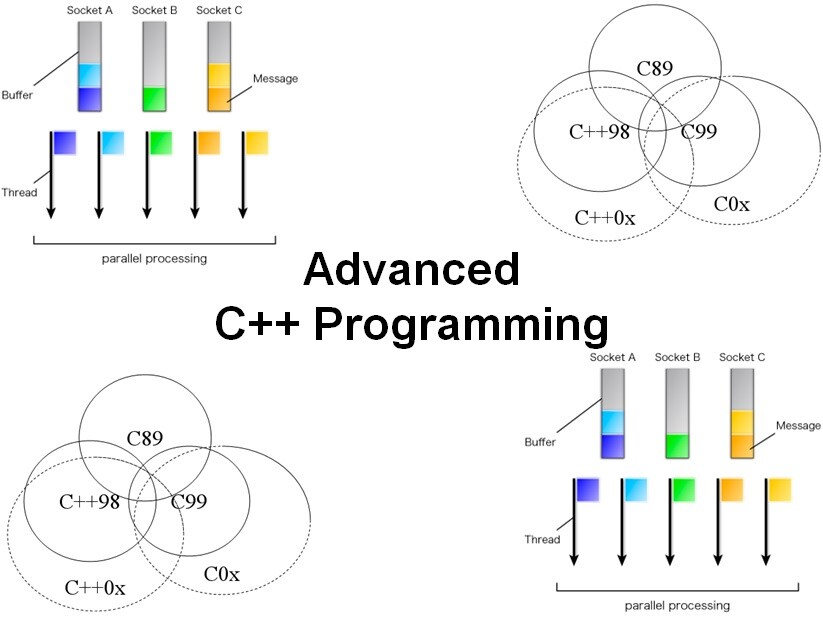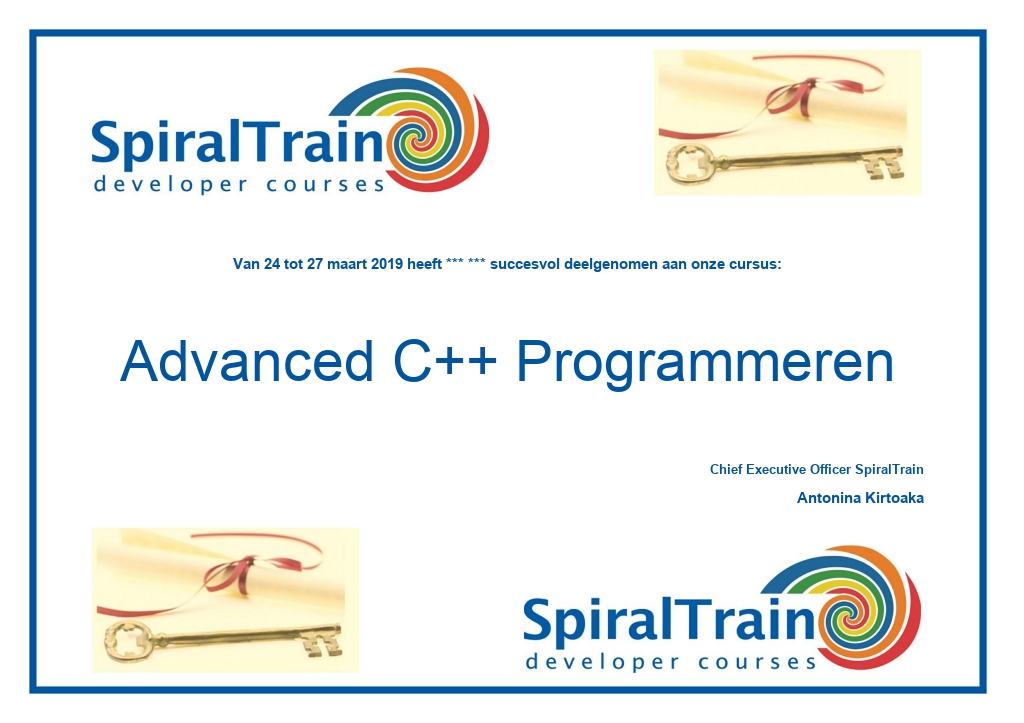- Leren door doen
- Trainers met praktijkervaring
- Klassikale trainingen
- Gedetailleerd cursusmateriaal
- Duidelijke inhoudsbeschrijving
- Maatwerk inhoud mogelijk
- Trainingen die doorgaan
- Kleine groepen
In de cursus Advanced C++ komen de nieuwe en geavanceerde aspecten van de C++ taal gebaseerd op de standaarden C++11, C++14, C++17 en C++20 ruimschoots aan de orde.
De cursus gaat van start met een overzicht van de features die in C++11 zijn geïntroduceerd zoals type inference, initializer lists, range based for loop, lambda functies en strongly typed enums.
Vervolgens wordt ingegaan op right references en de performance winsten die geboekt kunnen worden door move constructors naast copy constructors te gebruiken.
Ook de nieuwe mogelijkheden met betrekking tot inheritance met de keywords default, delete, override en final komen aanbod. En passant wordt ingegaan op de implementatie van virtual functions en de noodzaak van virtual destructors.
Daarnaast wordt in detail gekeken naar smart pointers en hierbij komen unique pointers, shared pointers en weak pointers aan de orde.
Ook operator overloading en templates staan op het programma, waarbij ingegaan wordt op variadic templates en perfect forwarding.
Het modern C++ Resource Acquisition is Initialization ofwel RAII idioom komt aan de orde bij exception handling.
Threads evenals de synchronisatie tussen threads zijn onderdeel van de standaard en worden besproken. Hierbij wordt ook ingegaan op asynchrone calls met promises en futures.
Vervolgens komen specifieke C++11, C++17 en C++20 features aan bod zoals optional types, structured binding declarations en constructies uit de wereld van functioneel programmeren zoals fold expressions.
De cursus besluit met een overzicht van geavanceerde mogelijkheden van de Standard Template Library STL.
De cursus Advanced C++ is bedoeld voor developers die bekend zijn met C++ maar die zich willen verdiepen in de meer geavanceerde technieken en mogelijkheden van de taal.
Om aan deze cursus deel te nemen is kennis van de basis concepten van C++ en uitgebreide ervaring met programmeren in C++ vereist. De deelnemers moeten vertrouwd zijn met onderwerpen als operator overloading, templates, virtual functions en polymorfisme.
De theorie wordt behandeld aan de hand van presentatie slides. Illustratieve demo’s worden
gebruikt om de behandelde concepten te verhelderen. Er is een sterke afwisseling van theorie en praktijk en ruime gelegenheid om te oefenen.
De deelnemers krijgen na het goed doorlopen van de cursus een officieel certificaat Advanced C++ Programmeren.

Module 1 : Modern C++ Features |
Module 2 : Move Semantics |
Module 3 : Inheritance |
|
C++11 Features Type Inference Auto Keyword Deduction with decltype Uniform Initialization Initializer Lists Range Based for Loop Null Pointer Constant constexpr Keyword Static Asserts Lambda Functions Strongly Types Enums User Defined Literals Raw String Literals |
Reference Initialization References and Pointers Rvalues and Rvalues in C++ Passing and Returning References Rvalue References Comparing Reference Types Rvalue Reference Usage Assignment Operator Copy Constructor Passing and Returning Objects Passing References to Objects Move Constructor Move Assignment Operator Golden Rule of 5 |
default and delete Keyword Delegating Constructors Inheritance Calling Base Class Constructors Multiple Inheritance Virtual Derivation Polymorphism Virtual Functions Abstract Classes Interfaces in C++ Destructors and Inheritance Virtual Destructors override Specifier final Specifier |
Module 4 : Smart Pointers |
Module 5 : Operator Overloading |
Module 6 : Templates |
|
unique_ptr Using unique_ptr Specialization for Arrays Replacement for std::auto_ptr std::make_unique shared _ptr Pointer Control Block shared_ptr Destruction Policy shared_ptr Interface Cyclic References weak_ptr |
Syntax Operator Overloading Overloading Numeric Types Overloading Overview Overloading Restrictions When not to Overload Operators as Class Members Operators as Friend Functions Overloading Stream Operators Overloading ostream and istream Overloading Unary Operators Overloading Binary Operators |
Template Functions Template Specialization Template Parameter List Inclusion Compilation Model Class Templates Template Member Functions Template Parameter Scope Templates and Statics Templates and Friends Alias Templates Perfect Forwarding |
Module 7 : Exception Handling |
Module 8 : Multiple Threads |
Module 9 : Synchronization |
|
Error Conditions and Exceptions Class Objects as Exceptions Parameter Catch Block Catching in Hierarchy Golden Rule Rethrowing Exceptions noexcept Specifier Preventing Resource Leaks RAII Idiom C++ Standard Exceptions User Defined Exceptions Exception Handling Costs |
Multiple Threads Benefits and Drawbacks Thread Class Joining Threads Detaching Threads Thread ID Callables Passing Parameters Pass by Reference Pass by std::ref and std::move Member Function as Thread Thread Local Storage |
Data Corruption Lock Guard Automatic Lock Management Mutex and RAII Recursive Locking Atomic Types Call Once Event Handling Condition Variables Wait and Notify Promises and Futures Asynchronous Tasks |
Module 10 : C++14-17-20 Features |
Module 11 : Standard Template Library |
|
|
Init-statement for if Selection Initialization Structured Binding Declarations const if Expressions Guaranteed Copy Elision Inline Variables Fold Expressions Optional Type Small String Allocations String View Generic lambdas Aggregate initialization |
STL Core Components Containers, Algorithms and Iterators Vectors, Lists and Dequeues Adapters and Associative Containers Maps and Hash Maps Bitsets STL Iterators Reverse and Iostream iterators Function objects STL Algorithms Predicates and Comparators STL Allocators |
